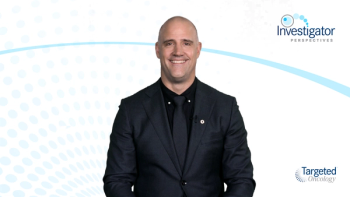
Emerging Combinations and Novel Agents for RR FL and MZL
Ian W. Flinn, MD, PhD, and Jason M. Melear, MD, discuss the role of PI3K inhibitor combination therapy and novel agents on the horizon for the treatment of R/R FL and MZL.
Episodes in this series

Jason M. Melear, MD: The future for these type of agents—it seems like a single agent clearly has activity, but at least from my standpoint, I would hope that we would get to the point where we would see it combined with other agents and have even better activity. I know in the trials, and even the UNITY trial itself, I believe they still have it open, has had a multitude of amendments over the years, and they have an arm where they have combination therapy with an anti-CD20 antibody. From my standpoint, I am hoping that looks good because that would seem to be a logical next step, to combine these with other agents like a CD20. Do you have thoughts on that, too? Does that seem logical or reasonable to you?
Ian W. Flinn, MD, PhD: Yes, absolutely; in fact, we have a study that is combining umbralisib with ublituximab, another CD20 antibody, in the frontline therapy of patients with follicular lymphoma. With the other drugs, you could never do that. We tried, but because of the autoimmune events, the adverse event profile, that approach had to be abandoned. We will see, but to me it looks like we might be able to use it in the front line with umbralisib and ublituximab; that combination seems to be effective, and we will see what the efficacy and adverse event profile of that treatment are like. I think combining it with a CD20 is important. We are also studying it in combination—not in the treatment of follicular lymphoma, but you could imagine it might work there as well—with venetoclax. That combination, ublituximab, umbralisib, and venetoclax, is being tested to treat patients with chronic lymphocytic leukemia [CLL], and we have had fantastic responses in that trial. I think there are a lot of different combinations that could be tested in follicular lymphoma and perhaps beyond that.
Jason M. Melear, MD: Iagree; we have the same trials where, when combining it with ublituximab, I have not seen any increased toxicity or infections or anything at all. I cannot really tell they are on the second agent there. It seems to be an effective combination, and it also, like you said, seems to combine well with the venetoclax in that trial. Again, I am not seeing a lot of increased toxicity in those patients with excellent responses, so hopefully it is going to be one we can combine with other agents and not have a lot of stops for toxicity issues. What do you think about these combinations? We could even move the PI3K inhibitors up in the line of our treatments. Do you think that would be a reasonable goal there?
Ian W. Flinn, MD, PhD: I think certainly with umbralisib that is the hope for those with follicular lymphoma and maybe even for those with CLL. I think with CLL it is such a tough market, I guess you might say; there are so many fantastic therapies in that setting with the BTK [Bruton tyrosine kinase] inhibitors, so it is a little harder competition there. In the treatment of follicular lymphoma, as you mentioned, we have not made the same changes. There have not been the fundamental paradigm shifts with the oral agents or with the noncytotoxic chemotherapy. In the treatment of follicular lymphoma, we are still using BR [bendamustine and rituximab] as frontline treatment, or R-CHOP [rituximab, cyclophosphamide, doxorubicin, vincristine, prednisone] in the front line, and so I think there is a lot more room for growth in the treatment of follicular lymphoma.
This transcript has been edited for clarity.








































